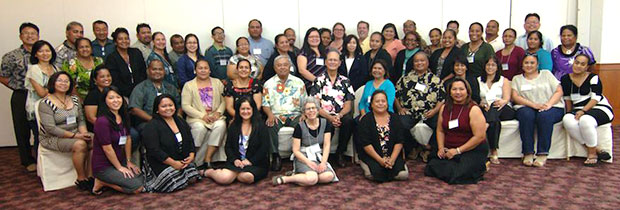
The Pacific Center of Excellence in the Elimination of Disparities (P-CEED) at the University of Hawaiʻi at Mānoa’s John A. Burns School of Medicine has been awarded a $1 million grant for policy, systems and environment interventions in the U.S. Affiliated Pacific Islands (USAPI). P-CEED’s new project will further develop, implement and evaluate evidence-based interventions that decrease tobacco use and promote good nutrition, with specific goals to curb illness.
The Racial and Ethnic Approaches to Community Health award is part of a U.S. Department of Health and Human Services initiative to support public health efforts to reduce chronic diseases, promote healthier lifestyles, reduce health disparities and control healthcare spending. The award will be housed in the medical school’s Department of Family Medicine and Community Health.
“The World Health Organization ranks obesity rates among Pacific Islanders the highest worldwide, and estimates that 75 perecent of deaths in the Pacific are caused by non-communicable disease that are associated with risk factors such as obesity, tobacco and poor nutrition” said Neal Palafox, P-CEED’s principle investigator. “The infrastructure and organization of our center has been developed and designed to work with coalitions based in the U.S. Affiliated Pacific Islands toward more effective prevention and control of these illnesses.”
P-CEED, under the direction of Palafox and Project Director Lee Buenconsejo-Lum, has worked with the Cancer Council of the Pacific Islands for 12 years to address cancer and chronic disease health disparities.
“These intervention and other efforts in comprehensive cancer control, diabetes and tobacco prevention and control are all aimed to achieve long-term goals of reducing rates of death and disability due to tobacco use by five percent, reduce the prevalence of obesity by three percent and reduce rates of death and disability due to diabetes, heart disease and stroke by three percent in the USAPI populations,” said Buencosejo-Lum.
To learn more about P-CEED’s prevention and wellness projects and the other Pacific Regional Cancer Programs and partnerships, visit the Pacific Cancer Programs website.

